Sustaining Digital Travel: Business Continuity Management for Traveloka
Identifying Critical Business Functions
Chapter 12
Detailed Business Processes for High-Level Function
Customer Support and Service Operations


Traveloka’s Customer Support and Service Operations are structured around ten core business processes, which cover everything from managing customer inquiries and complaints to processing refunds, supporting payments and fraud checks, and coordinating with partners.
The processes are reinforced by a strong focus on service quality, operational reporting, and crisis management, ensuring that customers receive responsive and reliable support throughout their journey.
By implementing robust service frameworks and continuously enhancing both human and automated support systems, Traveloka secures customer satisfaction, business continuity, and operational resilience.
Identifying these processes as critical functions reinforces the company's commitment to delivering superior customer experiences and maintaining trust in a dynamic and fast-evolving marketplace.
Detailed Business Processes: Customer Support and Service Operations
Customer Inquiry Management
Channels Handling
- Email, live chat, call centre, mobile app support, social media (Facebook, Twitter, Instagram, etc.)
Inquiry Categorisation
- Product inquiries (Flight, Hotel, Transport, Experiences, Insurance, etc.)
- Booking assistance
- Payment issues
- Refunds and cancellations
- Technical/app issues
Routing and Escalation
- Auto-assign to specialised agents based on product and complexity
- Escalate complex cases to Tier 2/3 or relevant departments (e.g., Finance, Product, Legal)
Booking Support and Problem Resolution
Real-time Booking Support
- Confirmations, changes, rebookings, ticket issuance issues
Post-Booking Issue Management
- Changes requested by customer (date, name corrections, rescheduling)
- Handling supplier-side disruptions (hotel overbooking, airline cancellations)
Service Recovery Actions
- Offer alternatives, compensations (vouchers, refunds), and goodwill gestures.
- Liaising with suppliers and partners (airlines, hotels, insurers)
Complaint Management
Complaint Receipt and Logging
- Structured case recording into CRM/ticketing system
Acknowledgement and Update Process
- Auto-acknowledgement emails or messages
- Regular status updates on the investigation
Root Cause Analysis and Resolution
- Analyse and address the cause of customer dissatisfaction
- Provide clear resolutions and feedback to the customer
Service Recovery Offerings
- Refunds, credits, and alternative service provision
Refund and Cancellation Processing
Refund Request Handling
- Assess eligibility (based on fare rules, hotel policy, insurance terms)
- Initiate refund process (internal + supplier coordination)
Cancellation Request Management
- Guide cancellation terms
- Facilitate customer-initiated cancellations
Tracking and Reporting
- Monitor refund status
- Proactively inform customers of refund timelines
Payment and Fraud Support
Payment Error Resolution
- Failed transactions, double charges, unauthorised charges
Fraud Detection and Customer Notification
- Identify suspicious transactions
- Communicate with the customer for verification.
Collaboration with Risk/Fraud Teams
- Hand over suspected fraud cases for deep investigation
Knowledge Base and Self-Service Management
Content Development
- FAQs, support articles, and guides for customers
Content Updates
- Regular updating based on new products, frequent issues, or feedback
Self-Service Optimisation
- Build intelligent chatbots and auto-resolution flows.
Service Quality Monitoring and Improvement
Customer Satisfaction (CSAT) Surveys
- Post-interaction surveys via email, app notifications
Quality Assurance Audits
- Random call/chat/email reviews
- Feedback loops to agents
Continuous Training Programs
- Product knowledge updates
- Customer service skills enhancement
KPI Monitoring
- First Response Time (FRT)
- Resolution Time
- First Contact Resolution (FCR) Rate
- CSAT/NPS (Net Promoter Score)
Operational Reporting and Analytics
Daily/Weekly/Monthly Operational Reports
- Volume of inquiries, average handling time, service level agreement (SLA) adherence
Trend and Issue Analysis
- Identify product/service areas causing repeated customer issues
Forecasting and Resource Planning
- Predict staffing needs
- Adjust operational capacity based on seasonality/ trends.
Crisis and Incident Management
Crisis Support Protocols
- Immediate response playbook (e.g., flight disruptions due to natural disasters, pandemics)
- Mass communication to impacted customers
Coordination with Crisis Management Team
- Align messaging, compensation policies, and recovery timelines
Post-Crisis Review
- Lessons learned and process improvements
Partner Support Coordination
Vendor/Supplier Issue Escalation
- Support partners (e.g., hotel managers, airlines) with system or operational issues
Partner Training and Knowledge Sharing
- Equip partners with self-service tools and operational guidelines
Joint Issue Resolution
- Collaborate with partners to solve customer cases quickly.
Traveloka’s Customer Support and Service Operations ensure seamless pre-sale, post-sale, and crisis management activities, enhancing customer loyalty and partner satisfaction.
The processes are designed to deliver fast, empathetic, and efficient service, integrating technology, human support, and continuous improvement.
Business Impact Analysis Table
|
Business Process |
Impact Description |
MTD |
RTO |
Impact Level |
|
Customer Inquiry Management |
Delays or failures result in poor customer experience, negative reviews, and lost revenue. |
8 hours |
2 hours |
High |
|
Booking Support and Problem Resolution |
Unresolved booking issues could lead to travel disruptions, refunds, and brand damage. |
8 hours |
2 hours |
High |
|
Complaint Management |
Poor complaint handling escalates dissatisfaction and potential legal exposure. |
24 hours |
4 hours |
Medium |
|
Refund and Cancellation Processing |
Delay in refunds can cause customer complaints and regulatory compliance risks. |
48 hours |
8 hours |
High |
|
Payment and Fraud Support |
Payment failures or fraud handling delays could cause financial loss and reputational harm. |
4 hours |
1 hour |
High |
|
Knowledge Base and Self-Service Management |
Lack of self-service resources increases load on live agents, resulting in slower response times. |
72 hours |
24 hours |
Medium |
|
Service Quality Monitoring and Improvement |
Delayed QA affects service consistency but has less immediate customer impact. |
5 days |
48 hours |
Low |
|
Operational Reporting and Analytics |
Lack of timely data hinders proactive issue management but has a delayed effect. |
5 days |
48 hours |
Low |
|
Crisis and Incident Management |
Ineffective response to crises can cause massive customer dissatisfaction and PR issues. |
4 hours |
1 hour |
High |
|
Partner Support Coordination |
Poor partner support can disrupt services (e.g., hotel overbookings) and damage partnerships. |
48 hours |
12 hours |
Medium |
Summing Up ...
Traveloka’s Customer Support and Service Operations are structured around ten core business processes, which cover everything from managing customer inquiries and complaints to processing refunds, supporting payments and fraud checks, and coordinating with partners.
The processes are reinforced by a strong focus on service quality, operational reporting, and crisis management, ensuring that customers receive responsive and reliable support throughout their journey.
By implementing robust service frameworks and continuously enhancing both human and automated support systems, Traveloka secures customer satisfaction, business continuity, and operational resilience.
Identifying these processes as critical functions reinforces the company's commitment to delivering superior customer experiences and maintaining trust in a dynamic and fast-evolving marketplace.




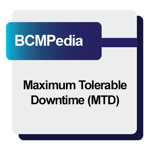





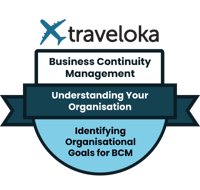

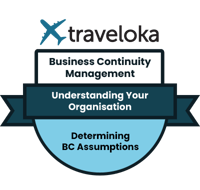
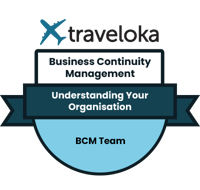









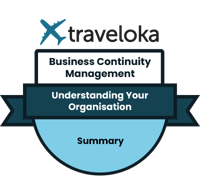


![Register [BL-B-3]*](https://no-cache.hubspot.com/cta/default/3893111/ac6cf073-4cdd-4541-91ed-889f731d5076.png)



![FAQ [BL-B-3]](https://no-cache.hubspot.com/cta/default/3893111/b3824ba1-7aa1-4eb6-bef8-94f57121c5ae.png)
![Email to Sales Team [BCM Institute]](https://no-cache.hubspot.com/cta/default/3893111/3c53daeb-2836-4843-b0e0-645baee2ab9e.png)





